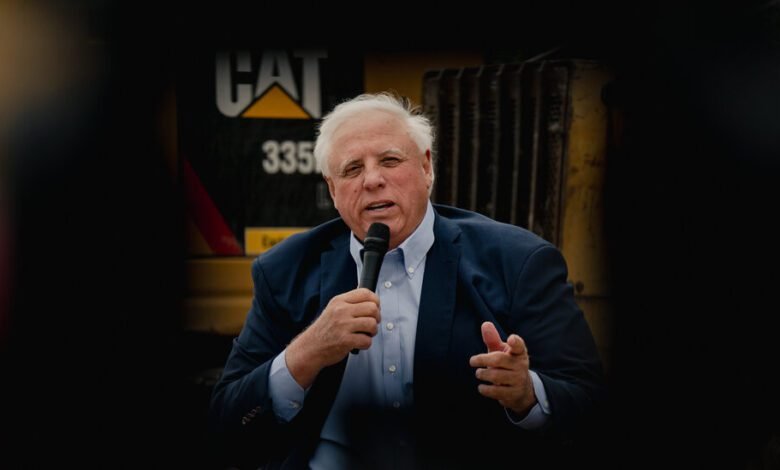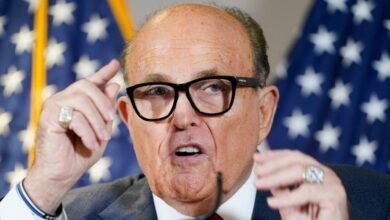Gov. Jim Justice faces heavy business debt as he seeks Senate seat

Jim Justice, the businessman turned politician and governor of West Virginia, has been hounded in court for years by banks, governments, business partners and former employees over millions of dollars in unfulfilled obligations.
And for a long time, Justice and his family businesses managed to fend off one threat after another with cunning legal tactics, notably at odds with the horrible personality that endeared him to so many West Virginians. As of Tuesday, he is heavily favored to win the Republican Senate primary and cruise to victory in the general election, especially after the departure of Democratic incumbent Joe Manchin III.
But now, as he completes his second term as governor and campaigns for a seat in the U.S. Senate, things seem more dangerous. Like Donald J. Trump, with whom he is often compared – Mr. Justice has faced a barrage of costly trials and legal setbacks.
And this time, there may be too many, some suspect, for Mr. Justice, 73, and his family to fend them off.
“It’s a simple matter of math,” said Steven New, a lawyer in Justice’s hometown of Beckley, W.Va., who, like many lawyers in coal country, has dabbled in Justice’s firms.
Justice and his dozens of companies would be able to handle some of these potential multimillion-dollar trials in isolation, New said. But “when you add it all up and put the trials together in time, it looks like he doesn’t have enough,” he said.
The son of a coal magnate, Justice took over the family business in 1993 and expanded his interests beyond coal, with acquisitions in agriculture and luxury hotels. Like many expanding companies, Justice companies took on prodigious debts. But they have also acquired a reputation for not paying them – and that may be affecting them.
A bank in neighboring Virginia that has served the Justice family for decades has begun the process of collecting on more than $300 million in delinquent loans. Some of the family company’s prized assets, including the 246-year-old Greenbrier resort, are in the bank’s crosshairs, and charges on the governor’s personal bank accounts and even his home are now a possibility. Efforts are already underway in Virginia to seize property belonging to Mr. Justice’s son, James C. Justice III, chairman of the family businesses.
In West Virginia, tax authorities placed liens on Greenbrier properties worth millions in unpaid taxes, just months after auctioning off delinquent properties owned by the governor elsewhere in the state.
Collecting such substantial debts pitted creditors against each other, sometimes to the benefit of judges. A bank sued Justice along with several banks last month after discovering that collateral for one of its loans, land near Greenbrier, had also been given to a series of other lenders.
In a separate case, a federal judge forced a court-owned coal company to turn over a company helicopter to a creditor to whom it owed millions of dollars, who in turn agreed to share the proceeds from the helicopter’s sale with another creditor, also the who owed millions of dollars. And still, the lawsuits, trials and collection efforts continue to pile up.
Neither the governor’s office nor lawyers for the Justice companies responded to questions. When asked about the growing volume of business problems, Mr. Justice has repeatedly said that the day-to-day operations of his companies are overseen by his children and that he is focused on his duties as governor.
“There is no way in the world I can take a second off focus from what has been my job since day one,” he told reporters in February. “I put up with this nonsense the whole time I was here and everything. But absolutely, there is no taking your eye off the ball.”
The most serious of Justice’s problems concerns Carter Bank and Trust, a regional bank based in southern Virginia. Carter Bank had been lending to the Justice family for decades, at one point making about $775 million in loans to Justice’s businesses, more than a quarter of the bank’s total net lending at the time.
The justice companies had been paying that amount steadily, but in April they failed to pay the remainder of that debt – $302 million in loans that had been personally guaranteed by the governor and members of his family. The bank demanded immediate repayment.
For the judges, this was – as described in a statement from Mr Justice’s son last summer – a “mega-crisis”. In November, the governor, his family and more than a dozen of his companies sued the bank in federal court for $1 billion, alleging that Carter Bank had engaged in unfair and coercive tactics that made it impossible to repay loans. .
The lawsuit against the bank didn’t slow things down. In January, a Virginia state court judge sided with Carter Bank, and the bank wasted no time in beginning the collection process.
The Justice companies took the case to the Virginia Court of Appeals, claiming they could not pay the bond, which could vary from $25 million to well over $300 million and would halt the collection process. The court said it could not stop the collection effort.
Meanwhile, the bank announced that it was auctioning off the Justice-owned Greenbrier Sporting Club, much to the shock and dismay of the club’s members, many of whom own multimillion-dollar homes near the club’s golf course.
That auction is being challenged in court and an April hearing has been postponed while discussions continue “in an effort to reach a resolution that can address the concerns of all parties,” a Carter Bank attorney said in a filing.
But the prospect of losing the sports club portended a threat to the crown jewel of the Justice empire: the Greenbrier Resort. Justice’s decision to rescue it from bankruptcy in 2009 made him a state hero, and since then the resort, valued at well over half a billion dollars, has hosted Republican congressional retreats, professional football training camps and large profitable events. golf tournaments, including one for LIV Golf, the league created by Saudi Arabia’s sovereign wealth fund.
It is also among the guarantees of Carter Bank, and not just Carter: a loan of up to $50 million from JPMorgan Chase to Mr. Justice is also partially guaranteed by the Greenbrier. Legal issues involving the business of Justice often reveal a tangle of overlapping responsibilities, and the fight with Carter Bank is no exception. In February, the largest creditor in the Justice empire, Credit Suisse, intervened and sued Carter Bank. Credit Suisse, which owes about $850 million, claims in its lawsuit that Carter Bank’s collection efforts made it more difficult for Credit Suisse to collect its own debt from Justice’s businesses.
Lawyers for court-owned companies often claim that sued companies cannot pay because they simply do not have the money. But a number of plaintiffs have argued that this is a sham: that court officials silently empty the accounts of companies targeted by creditors and transfer the funds to other accounts, thwarting debt collection efforts.
A federal magistrate in Kentucky, where a company has been trying for years to collect tens of millions of dollars in a judgment, called the law firms’ moves to avoid turning over financial information “the most egregious litigation misconduct” he has ever seen. it found. the bank. The federal district judge overseeing the case is now weighing whether to hold senior Justice officials in contempt.
As these threats accumulate, Mr. Justice insists this is all a distraction. On his federal candidate disclosure form, he listed assets valued at about $2 billion and liabilities at less than $110 million; This list, however, does not include any loans from Carter Bank or Credit Suisse, where his companies were the borrower and he was the guarantor.
He routinely says that everything will work out in the end.
“Our family has built an empire of things that employs lots and lots of people,” Justice said at a news conference. “In the end, everything seems to work out.”
Your creditors may not agree with this.
Thomas Link, 59, owner of a small excavation company, was hired to do some work for Justice-owned companies in 2021. People said he would regret doing business with the judges, but he said he was approached by the governor himself. . Several months later, Mr. Link was broke.
“’I told you so’: that’s all I heard,” he said.
On April 24, after a year and a half of litigation, the Justice Company settled with Mr. Link, agreeing to pay him a fraction of the hundreds of thousands he says he is owed. The company failed to pay the first settlement payment.




